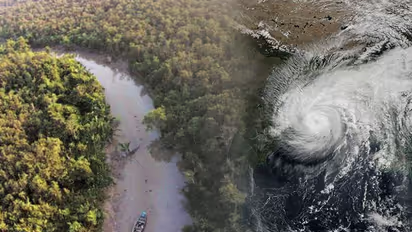
Bengaluru: Cyclone Bulbul, which hit West Bengal and later affected Bangladesh, has killed several people and damaged a lot of property.
However, it would be heartening to note that the severity of the cyclone was mitigated by the mangroves of Sunderbans.
Also Read: Mamata to conduct aerial survey
“Some of the areas in and around Sagar Islands, where mangrove cover is minimum has been badly affected by the cyclone, while in the eastern part of these affected places, where there is mangrove cover, the effect of the cyclone has been found to be lesser,” said Kalyan Rudra, chairman of West Bengal Pollution Control Board, as quoted by Milleniumpost.in
Since the British period, forest cover has significantly deteriorated, with habitat in as many as 54 islands of the Sunderbans being destroyed.
It is interesting to note that the Sunderbans played a similar role during Alia in 2009 too.
The Sunderbans, which in English means ‘Beautiful Forest’ is a mangrove area at the meeting point of confluence of Ganga, Brahmaputra and Meghna Rivers, in the Bay of Bengal.
It covers an area of about 10,000 square kilometres.
The forests provide habitat to 453 faunal wildlife, including 290 bird, 120 fish, 42 mammal, 35 reptile and eight amphibian species.
Four protected areas in the Sundarbans are enlisted as UNESCO World Heritage Sites, namely Sundarbans National Park, Sundarbans West, Sundarbans South and Sundarbans East Wildlife Sanctuaries.
It is also more interesting to note that mangrove forests also play a pivotal role in mitigating the consequences of tsunamis.
Scientists say that these mangroves can reduce the devastating impact of tsunamis and even coastal storms by absorbing some of the waves' energy.
For example, when the tsunami hit Tamil Nadu several years ago, areas with dense mangroves suffered fewer human casualties and less damage to property compared to areas without mangroves.
In simple terms, the act as natural barriers to rein in the fury of deluge.